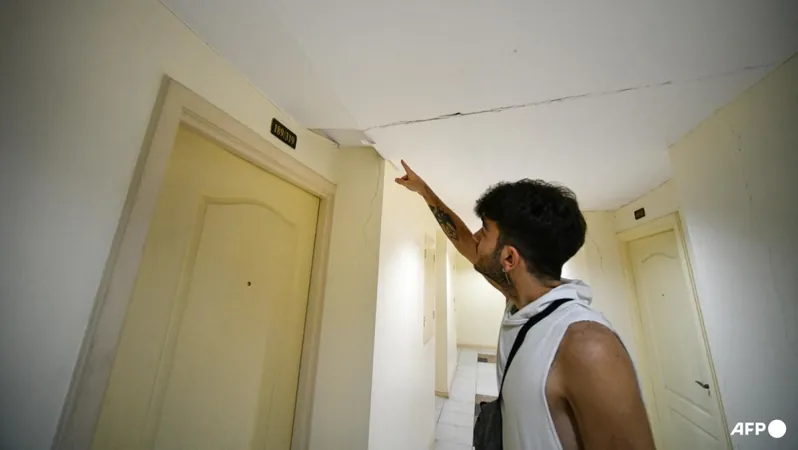
Shocking Quake Rattles Bangkok: Residents Demand Safer Homes Amidst Rising Fears
2025-04-07
Author: Nur
BANGKOK: The ground shook with a terrifying force as a 7.7-magnitude earthquake struck neighboring Myanmar on March 28, unleashing a wave of panic throughout Thailand's bustling capital. Phatsakon Kaewkla, a 23-year-old sales coordinator, confronted the alarming reality of living in a high-rise apartment when he returned home to discover significant cracks in the walls of his 22nd-floor unit. Overcome with fear, he opted to stay away for two days until structural experts assured him the building was safe.
Phatsakon is one of many Bangkok residents now grappling with anxiety over their safety, as hundreds of residential buildings were damaged during this unprecedented seismic event. The tremors, which rattled a city typically unaccustomed to earthquakes, have raised crucial questions about the earthquake safety measures in place for high-rise buildings amidst a skyline filled with towering structures.
According to local real estate consultant Owen Zhu, the earthquake has had a “significant” impact on the property market, pushing many residents to question their living arrangements. "People are starting to understand that living on higher floors may pose greater risks in terms of earthquake resilience compared to low-rise buildings," he explained, noting a sharp increase in inquiries from individuals seeking to relocate due to overwhelming “fear and anxiety.”
Residents like Yigit Buyukergun from Turkey, who was on the 22nd floor with his wife during the quake, echoed these concerns. After emerging from under a table, they surveyed the damage and were alarmed by the extent of the cracks. "Everywhere is cracked, especially in the corridor. You can see the roof conditions are really alarming," Buyukergun stated, expressing skepticism about the assurances given by the building's management regarding its safety.
The aftermath of the earthquake revealed a deeper issue: a disparity between tenants and property owners regarding the safety and habitability of quake-damaged apartments. "There's a significant gap in perception and judgment between the two parties," Zhu noted, as landlords often view their properties as safe, while tenants vehemently argue the opposite, leading to rising disputes over deposits and lease agreements.
In light of the disaster, city officials are now scrutinizing building regulations, as the earthquake exposed the inadequacies of Thailand's earthquake safety standards. The recent collapse of a 30-story construction site in Bangkok, trapping dozens of workers—most of whom are still unaccounted for—has compounded public fears and called into question the quality of building materials used in developments.
As anxiety spreads, many residents are opting for low-rise alternatives, prioritizing safety over the convenience of high-rise living. Potential buyers now demand assurances that any high-rise property sustained minimal or no damage, highlighting a shift in the real estate landscape. Zhu believes that in the long run, property values may rise as developers invest in advanced seismic-resistant construction methods, raising the bar for Thailand's real estate sector.
However, for residents like Buyukergun, mere discussions of improving building regulations are insufficient to quell their fears. Similar to the anxiety he felt in his native Turkey—known for its seismic activity—he now realizes that even a country like Thailand, previously considered safe, can experience the unexpected. "I used to think Thailand was safe. That's why I couldn't believe the quake happened here," he lamented.
As Bangkok wrestles with the repercussions of this natural disaster, the quest for safer living conditions becomes more urgent, prompting many to reconsider what “home” truly means in a city built on lofty ambitions and towering dreams.



 Brasil (PT)
Brasil (PT)
 Canada (EN)
Canada (EN)
 Chile (ES)
Chile (ES)
 Česko (CS)
Česko (CS)
 대한민국 (KO)
대한민국 (KO)
 España (ES)
España (ES)
 France (FR)
France (FR)
 Hong Kong (EN)
Hong Kong (EN)
 Italia (IT)
Italia (IT)
 日本 (JA)
日本 (JA)
 Magyarország (HU)
Magyarország (HU)
 Norge (NO)
Norge (NO)
 Polska (PL)
Polska (PL)
 Schweiz (DE)
Schweiz (DE)
 Singapore (EN)
Singapore (EN)
 Sverige (SV)
Sverige (SV)
 Suomi (FI)
Suomi (FI)
 Türkiye (TR)
Türkiye (TR)
 الإمارات العربية المتحدة (AR)
الإمارات العربية المتحدة (AR)